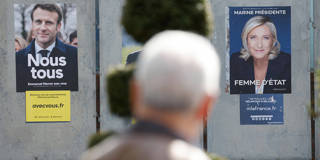Although Europe has begun to make up for years of neglect in terms of defense spending, it remains woefully ill-equipped to win over other countries through the power of attraction and persuasion. Each side in the European culture war is uniquely unappealing to billions of people around the world.
BERLIN – The Ukraine crisis shows that the European Union has a problem with power. While its hard-power deficit has recently moved to the center of attention, its philosophical and political shortcomings are an even bigger concern. After all, given Germany’s Zeitenwende (foreign-policy “turning point”), Finland and Sweden’s debates over NATO membership, and the size of European rearmament spending pledges, Europe likely will have more military resources than anyone other than the United States before too long. But even then, it will have a soft-power problem.
Europe is home to two identity-building projects, both of which are deeply alienating to the rest of the world. Each was represented in the second round of the French presidential election, where the incumbent, Emmanuel Macron, defeated the far-right nationalist Marine Le Pen to secure a second term.
Macron framed the campaign as a choice about what kind of civilization France – and Europe – wants to be. He portrayed his country as the ultimate embodiment of enlightened civic virtue. For him (and for Europeans like myself), the European project is an elaborate attempt to transcend the continent’s bloody history of nationalism, imperialism, and genocide. The EU is meant to forge a new European identity based on civic principles such as international law (against “might makes right”), liberal democracy (against populist majoritarianism), privacy (against “surveillance capitalism”), and human rights (against the surveillance state).

BERLIN – The Ukraine crisis shows that the European Union has a problem with power. While its hard-power deficit has recently moved to the center of attention, its philosophical and political shortcomings are an even bigger concern. After all, given Germany’s Zeitenwende (foreign-policy “turning point”), Finland and Sweden’s debates over NATO membership, and the size of European rearmament spending pledges, Europe likely will have more military resources than anyone other than the United States before too long. But even then, it will have a soft-power problem.
Europe is home to two identity-building projects, both of which are deeply alienating to the rest of the world. Each was represented in the second round of the French presidential election, where the incumbent, Emmanuel Macron, defeated the far-right nationalist Marine Le Pen to secure a second term.
Macron framed the campaign as a choice about what kind of civilization France – and Europe – wants to be. He portrayed his country as the ultimate embodiment of enlightened civic virtue. For him (and for Europeans like myself), the European project is an elaborate attempt to transcend the continent’s bloody history of nationalism, imperialism, and genocide. The EU is meant to forge a new European identity based on civic principles such as international law (against “might makes right”), liberal democracy (against populist majoritarianism), privacy (against “surveillance capitalism”), and human rights (against the surveillance state).